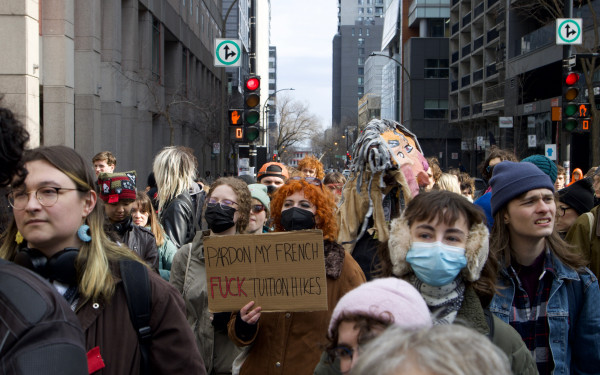Editorial: Tuition Should Not Be a Means to Exploit Students
JMSB Programs’ Hikes Repeat Pattern of Profiting Off International Students
Concordia’s Board of Governors approved tuition hikes for three programs last Wednesday in the John Molson School of Business, with international students taking the biggest financial hit–again.
The three programs in question are part of the Goodman Institute of Investment Management: both the diploma and masters programs in investment management, and the business administration in investment management masters program.
Currently, the tuition for these programs is around $18,000 for Quebec and out of province students. Next year’s incoming students will have to pay $22,000 per year, then rising to $23,000 annually in 2020, then $24,000 in 2021.
But for international students, the blow is worse: their tuition will rise up to $29,000 by 2021.
Plans to increase the tuition were only made public last Monday, after they appeared on the agenda for Concordia’s Board of Governors. With students only knowing about the vote for tuition increases at the last minute, no room was given to debate the question, and so it quietly passed without much discussion or protest on campus.
As disappointed as we are, we’re not surprised. At the end of the winter semester last year, tuition increases were also quietly passed without any warning for international undergraduates in engineering and computer science and in the John Molson School of Business.
The Board of Governors uses this tactic because they know it’s effective at getting tuitions raised with minimal backlash. When tuition increases for international students were made public in advance of a 2016 vote on the matter, students mobilized and succeeded in pressuring the board to vote against the hike.
It’s no surprise then that Concordia President Alan Shepard consistently refuses to give us answers when we ask whether the school is looking to increase international tuition rates. With warning comes strong dissent, and the school can’t make money when that happens.
It reflects a trend of treating international students like cash cows, even before Quebec announced it would be deregulating tuition for international students in fall 2019.
Tuition hikes add to our financial precarity. International students have to balance high tuition rates with increasing costs of living, and are also less likely to mobilize out of concern for their security in their school or in the country, and raising their tuition takes advantage of that fact.
These students may also need to take on an unpaid internship in their field, on top of paying tuition. The added financial stress of a tuition hike makes education less accessible to minorities.
At the board meeting, it was mentioned that careers in the fields affected by this hike usually come with high salaries, so paying the increased tuition is an investment in the student’s success, but how can low income folks access these programs without the stress of student loans? It’s also important to note these hikes are for masters and a diploma program, students have already dropped a lot of money on their past degrees.
It’s crucial to take a stand against all hikes, even if they don’t directly affect us. In the case of international students’ tuition being raised, solidarity from Quebec or out of province students takes on an added importance.







_600_375_s_c1.png)